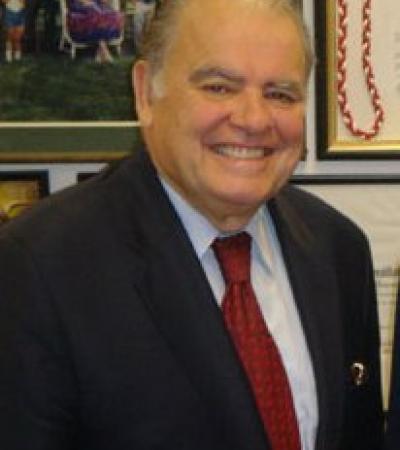Enrique V. Iglesias was re-elected President of the Inter-American development Bank on November 3, 1997, for a third five-year term that began on April 1, 1998. Iglesias was first elected President of the IDB in 1988, succeeding Antonio Ortiz Mena (México, 1970-1988) and Felipe Herrera (Chile, 1960-1970). During his first term Iglesias successfully concluded negotiations for the Bank's Seventh General Increase of Resources, which enabled the IDB to help its borrowing member countries enter into an era of reform, liberalization and integration, as well as to carry out a program of modernization for the institution itself. Also during this period, the Inter-American Investment Corporation, the Bank's affiliate for providing direct assistance to small- and medium-size private enterprises, started its operations.
In 1994 Iglesias steered a new course for the Bank as mandated by the Board of Governors for the Eighth General Increase of Resources. Social programs were given a priority, and new types of operations were initiated, such as projects to strengthen civil society and improve governance. Bank operations were reorganized to strengthen field staff, quicken decision making and enhance overall efficiency.
Iglesias was Minister of External Relations for Uruguay from 1985 to 1988; Executive Secretary of the United Nations Economic Commission for Latin America and the Caribbean (ECLAC) from 1972 to 1985; Secretary General of the United Nations' Conference on New and Renewable Sources of Energy held in Kenya in 1981; and Chairman of the conference that launched the Uruguay Round of Trade Negotiations (Punta del Este, Uruguay, 1986). This Round led to the creation of the World Trade Organization, the successor to the General Agreement on Tariffs and Trade (GATT). He was President of Uruguay's Central Bank from 1966 to 1968.
In 1954 Iglesias began his professional career in the private sector as Managing Director of the Bank Unión de Bancos del Uruguay. From 1964 to 1967 he was Uruguay's delegate to the meetings of the Latin American Free Trade Association and the Economic Commission for Latin America and the Caribbean (ECLAC), and he was also Uruguay's representative to the Inter-American Committee of the Alliance for Progress.
In the academic field he was Professor of Economic Development and Director of the Institute of Economy at Universidad de la República in Uruguay. He was a member of the board of directors of the Latin American Council of Social Sciences (CLACSO), and he attended several courses offered by ECLAC, the Latin American Integration Association (ALADI), and the United Nations Latin American and Caribbean Institute for Economic and Social Planning (ILPES), which he presided from 1967 to 1972.
In 1968, Iglesias headed a group of experts that worked with economist Raúl Prebisch in preparing a study on the economic situation of Latin America, requested by Felipe Herrera, then IDB president.
Iglesias has written many articles and papers on Latin American and Uruguayan economic concerns, including Uruguay's exchange system, capital markets, the nature and scope of the external financing problem, the struggle for multilateralism, and the IDB policies in the 1960s. He is the author of Latin America on the Threshold of the 1980s, The Energy Challenge, and Development and Equity: The Challenge of the 1980s. Other works, published before Iglesias became IDB President, include ECLAC and the Economic Relations of Latin America, Perspectives on Economic Development in Latin America, and Uruguay: A Proposal for Change. The later work is associated with Uruguay's National Plan for Economic Development, which was undertaken under his direction during the 1960s.
Between 1988 and 1989 Iglesias successfully mediated the fisheries dispute between Canada and France. The two nations eventually agreed on fishing quotas for French ships in different zones of the Gulf of St. Lawrence and the nearby waters of coastal Canada and Newfoundland.
Iglesias was born in Asturias, Spain, and is a naturalized Uruguayan citizen. He graduated from the University of the Republic of Uruguay in Economics and Business Administration in 1953 and went to pursue specialized programs of study in the United States and France.






